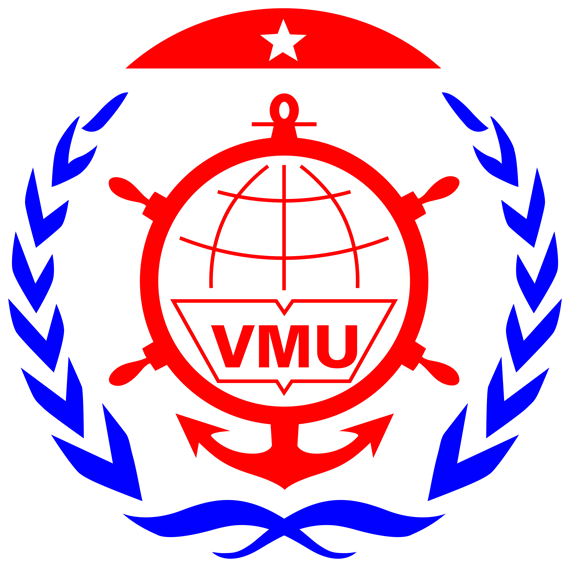1. Introduction
|
Program title: |
Bachelor of Global Studies and Maritime Affairs |
|
Graduation degree: |
Bachelor's degree |
|
Study model: |
Full-time |
|
Total credits: |
144 |
|
Used language: |
English |
|
Training duration: |
4 years (8 semesters) |
|
Responsible Faculty: |
Faculty of Economics |
|
Website: |
|
|
Address: |
Room 114, 1st floor A4 Building, Vietnam Maritime University 484 Lach Tray - Le Chan - Hai Phong |
The Global Studies and Maritime Affairs Program is a collaboration project between Vietnam Maritime University (VMU) and the California Maritime Academy (CMA), California, USA. The curriculum was built on the internationally standardized program provided by the partner institution - California Maritime Academy - one of the seven prestigious maritime academies in the United States. The program is conducted entirely in English, delivered by a highly qualified faculty comprising international lecturers and enthusiastic lecturers from globally advanced education programs. The curriculum framework is regularly updated and revised to meet learners’ needs while ensuring that students excel in both the domestic and international maritime workforce.
Upon graduation, students will obtain a Bachelor's degree in Global Studies and Maritime Affairs, well-trained comprehensively in three aspects: knowledge - skill - attitude. Additionally, students will gain an in-depth understanding of knowledge blocks: maritime economics, maritime business, maritime policies, maritime environment. They are also equipped with skill blocks covering teamwork skills, communication skills, critical thinking, life learning, digital literacy, brainstorming techniques, and design thinking. GMA graduates will possess the ability to develop ideas in policy research, analyze the operational dynamics of maritime organizations and enterprises, and stand out in human resources in the Asia-Pacific region, contributing to the development of the maritime economy and the nation’s economic growth, defense, and global integration.
Beyond academic learning, the program offers students hands-on experiences through internship activities with more than 30 partnerships with companies specialized in the maritime industry. Additionally, the teaching methods are continuously updated and the connection with outside maritime related businesses is maintained through the participation of guest speakers from shipping companies, port operating companies, and logistics companies in Hai Phong city in our lectures. On the other hand, the GMA student club provides a playground for GMA students to practice with domain knowledge while strengthening the skills in teamwork, project management, networking, leadership, etc under the support of GMA Division. With an emphasis on both theoretical knowledge and practical applications, along with vibrant student engagement movements, the program provides students with numerous opportunities to unlock their full potential and thrive in the dynamic maritime industry.
Furthermore, GMA graduates can find a variety of choices to start their careers at international and domestic institutions and firms, namely international maritime institutions such as the International Maritime Organization (IMO), the International Maritime Bureau (IMB), Non - governmental organization (NGOs), government departments under the Ministry of Construction, Vietnam Maritime Administration, maritime law firms, shipping companies, port operating companies, marine insurance corporations, marine safety companies, ship broker, shipping agent, maritime supply companies, shipyard, logistics companies, freight forwarding companies, ICD, depot operators, etc.
2. Curriculum
The Bachelor of Global Studies and Maritime Affairs program is organized into 8 semesters. One of the key advantages of this program is the flexibility to shorten the duration of study to three years for students who meet the required English proficiency level. For those without a strong language background, the program provides a comprehensive curriculum designed to enhance their English skills.
Semester I focuses on language development, reinforcing all four English skills, improving presentation and teamwork abilities through Basic English courses. It also enhances students' understanding of society and raises their social awareness through courses such as Marxist-Leninist Philosophy and General Laws. Semester II emphasizes the proficient use of English for academic and professional purposes, alongside expanding students' understanding of Scientific Socialism and Marxist Political Economics.
By Semester III, students begin studying fundamental economics courses while applying their enhanced English proficiency. Subjects such as Algebra and Microeconomics develop logical thinking skills, while courses like Globalization, World Maritime History, and Introduction to Comparative Politics introduce students to different political systems and help them gain a global perspective on political affairs and the history of the maritime industry.
In Semester IV, the curriculum enhances critical thinking and provides a deeper understanding of economic systems and the role of governments through courses such as Macroeconomics and Environment of Modern Business. At the same time, students develop foundational maritime knowledge through subjects such as Maritime Cargo and Fundamentals of Logistics and Supply Chain, ensuring they grasp the key principles of maritime trade and global logistics networks.
Semester V provides an in-depth exploration of maritime transport with courses such as Transport Geography, Geopolitics of Energy, and Port Management and Operations. Subjects like International Business and International Maritime Organizations further sharpen students’ global outlook, equipping them with knowledge of world politics and economics, thereby fostering their development as global citizens.
Semester VI introduces more advanced topics such as International Relations, Business Ethics, and Globalization of Culture. Courses on Maritime Economics and Comparative Maritime Policy provide essential knowledge and skills for students to engage in international trade, contribute to domestic economic development, and understand the competitive landscape of global economies.
Semester VII delves deeper into maritime security and environmental sustainability, covering subjects like Maritime Security, Ocean Environmental Management, and Environmental Law and Policy. At this stage, students gain specialized expertise in Maritime Economics and Special topics in Maritime Business, excel as competitive professionals in the industry.
In the final semester, students consolidate their learning through practical experience in the Graduation Internship. This internship immerses the students in real-world challenges, and the Graduation Dissertation illustrates their ability to put knowledge from previous semesters into practice and turn their vision into reality.
